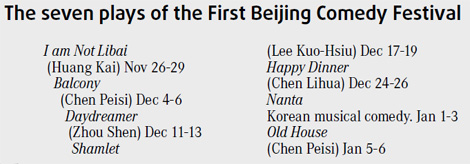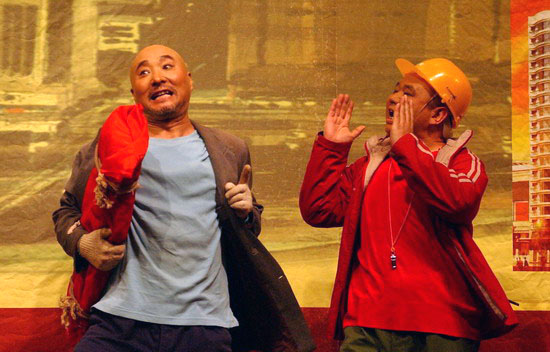Chen Peisi: Just for laughs
Chinese comedy is poised for take-off, says veteran comedy artist Chen Peisi and the man behind the First Beijing Comedy Festival that will run at BTV Theater from November 26 to January 6, 2010.

It will bring together seven modern comic dramas - two by Chen, one from Taiwan, one from South Korea and the other three by young Chinese directors.
Asked why this new focus on comedy Chen says, with disarming candor, that Chinese audiences are more easily amused "because life is easier now", unlike his father's generation, when yelling and crying on stage was an outlet for anger and suffering. His father Chen Qiang, the first generation of Chinese actors, was known for playing the bad guy on screen.
Chen's stage persona - timid and funny - is nothing like his real self - serious and private.
Dressed in a traditional Chinese suit and cap, and Mao-era cloth shoes, he discusses the future of the comedy genre in China with characteristic thoughtfulness.
"All of the young comedians are exploring on their own, with little formal training," he says.
So why not open a Chen Peisi school?
"Then all of China's comedians will be Chen Peisi," says the dour comedian, in a rare flash of humor in the 1-hour-long interview.
Unlike other theater stars, who live in luxurious apartments downtown, Chen bought a piece of land in the suburbs of northwest Beijing in 1999 and built two houses himself. He eschews brand names, rarely appears under the spotlight and seldom uses the Internet.
"From the day I started my career in comedy, I was aware that this art form should become part of our everyday lives," says Chen earnestly. "I knew that if I offered the platform, the performers and audiences would be there."
|
|
|
Chen Peisi (L) in "Balcony" [sina.com] |
While comic drama isn't a novel concept in the capital and small local theater companies have been entertaining fans for years with their brand of humor, Chen says: "I am trying to find out why and when people laugh, not just how to make them laugh".
Of the seven comedies featured in the festival, Chen's "Balcony" has been performed in more than 20 cities around China since its debut in 2005. Part of his drama trilogy, the others being "Tuo'er" and "Even Relatives Keep Careful Accounts," "Balcony" tells the story of labor contractor Lao Mu, who is heavily in debt and pretends to commit suicide by jumping off a tall building. The incident leads to the discovery that his boss Huo has been embezzling funds and keeping a concubine.
"We were unknowns in the theater scene then and started with various experiments," Chen says of the years leading up to Balcony. "We were lucky to have such a good script and good actors. We could predict the success even before it (the play) premiered."
The 55-year-old's confidence comes from his rich stage experiences since his teenage years. Chen rose to fame with another famous comedian, Zhu Shimao, with their debut show "Eating Noodles" in CCTV's Spring Festival Gala of 1984. The two became regulars on CCTV's annual gala and Chen soon rose to a top position.
In 1991, Chen founded his own company and developed his film career. His "Father and Son" series won him millions of fans around the country.
But after staging "The Prince and the Postman," in 1998, for the CCTV Gala, he faded from the spotlight and tried to return to the stage.
Chen took CCTV to court in 1999 when China International Television Company, a CCTV subsidiary, published the comedic sketches done by Chen and Zhu for the gala without their permission. They won the suit in 2000 and were paid 330,000 yuan (US$48,400) in compensation.
Touching upon his disagreements with CCTV briefly Chen says: "Some of my humor didn't get across to others. And sometimes, my original ideas had to be changed and even killed and this was unacceptable to me."
"Stage performances are more demanding, especially for a comedian, as there is instant feedback from the audience. But there are fewer limitations. I felt that I couldn't bear the censorship constraints imposed by CCTV," he says.
In the past several years, Balcony and Tuo'er have made more than 60 million yuan (US$8.8 million) with hundreds of stage performances.
Chen attributes this success to being original. "I didn't watch and borrow anything from foreign comedy shows because our cultures are different."
His latest comic drama "Lao Zhai," or Old House, which will premiere at the comedy festival, is a new experiment in combining a thriller with comedy, says Chen.
"Audiences can participate by playing detective while the characters on stage provide the humor," he says.
Chinese audiences tend to be inhibited and passive, he adds. "They feel they are in a theater to watch a show, not to participate. I want to change this mindset with my new work."
He says that after watching shows by some of the young directors and young xiangsheng (crosstalk) performers, he is convinced that Chinese comedy has a bright future. "Good comedy requires good control of the tempo and countless trials, which is tough," he says.
"It may take years but it's going to happen."
 0 Comments
0 Comments








Comments